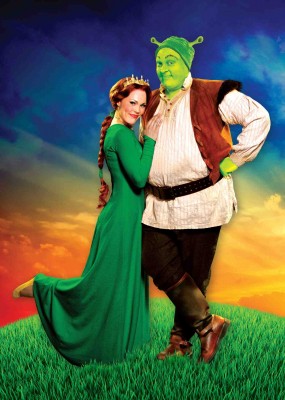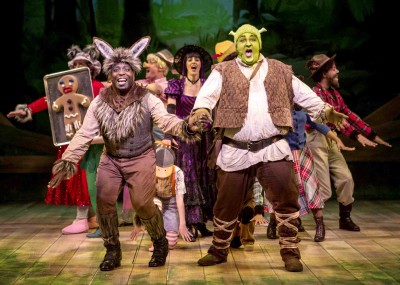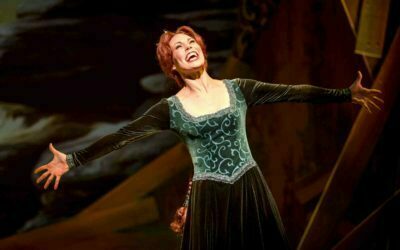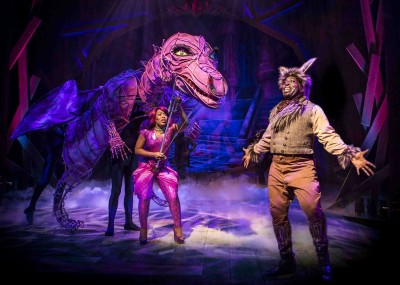Shrek: The Musical

Book & Lyrics by David Lindsay-Abaire
Music by Jeanine Tesori
Directed by Rachel Rockwell
Produced by Chicago Shakespeare Theater
This sugary pop confection still contains a couple of sweet surprises…
Audience members taking their seats on Friday’s opening matinee could barely keep still. And I’m not just talking about the kids. Full-grown adults wearing green novelty Shrek ears bounced their legs and giggled. It was a wonderful sight to see, and the excitement of the summer heat was charged even within the darkened confines of CST’s chilled theater. And not without due cause.
Shrek: The Musical—based on the 2001 smash hit film from DreamWorks, in turn based on the picture book by William Steig—is a hot property. Book and lyrics are by Pulitzer-prize winning playwright David Lindsay-Abaire, the adrenalized pop score comes from composer Jeanine Tesori, and taking the realm as director/choreographer is Chicago’s own Rachel Rockwell. The 2008 Broadway premiere clocked in at two and half hours, but Rockwell’s leanly fashioned 75 minute version doesn’t feel rushed, and will serve antsy children and their parents well.
Fans of the movie will find few significant changes. Lindsay-Abaire keeps much of the movie’s plot structure (and more than one of its better gags). When everyone’s favorite farting ogre Shrek finds his cozy swamp land invaded by a horde of evicted fairytale critters, he goes off to find the guy responsible. On his way he picks up a talkative tag-along named Donkey who instantly sees through Shrek’s grumpy hard outer shell (or rather, the layers of an onion, as Shrek prefers to explain it).
 And its not long before the duo are sent out on a rescue mission by the diminutive blowhard Lord Farquaad to rescue the Princess Fiona from her tower. Farquaad has eyes on the royal prize, but that’s no mind to Shrek who only cares enough to go back to his solitary life. But Fiona ends up being more than what Shrek has bargained for, and…well…we all know what happens when Beauty at last meets her Beast.
And its not long before the duo are sent out on a rescue mission by the diminutive blowhard Lord Farquaad to rescue the Princess Fiona from her tower. Farquaad has eyes on the royal prize, but that’s no mind to Shrek who only cares enough to go back to his solitary life. But Fiona ends up being more than what Shrek has bargained for, and…well…we all know what happens when Beauty at last meets her Beast.
The winking humor of the movie translates well to the stage, and there’s plenty of genuine fun had by Rockwell’s talented cast of fairytale misfits. Michael Aaron Lindner as the green-faced title character has the blustering good humor of a Jackie Gleason, and as his ‘noble steed’ Donkey, James Earl Jones II still manages to carve out his own particular niche with a character almost entirely defined by Eddie Murphy’s original film performance.
But Summer Naomi Smart as the sharp-tongued, wise-cracking and more than slightly indecorous fairy princess Fiona is fittingly spell-binding, her infectious enthusiasm and playful spirit casting a magic in its own right. Her duet with Shrek—a ‘gas-off’ in the vein of Irving Berlin’s ‘Anything You Can Do’—titled ‘I Think I Got You Beat’ is conclusive evidence that Smart is more than a (very) pretty face. Don’t let those marble cheekbones and her larkish registers fool you. Beneath that princess glamour is a whip-smart comedienne that could charm the pants of a Big Bad Wolf.
And Travis Taylor gives an equally notable turn as the miniature Lord Farquaad. Walking on his knees, a tiny pair of prosthetic legs attached to his upper thighs, Taylor’s physical endurance alone is impressive. But his portrayal of Farquaad as an Ed Grimley-like hyperactive manchild struck me as one of Rockwell’s more appreciatively novel departures from the film. And Taylor does more than simply strut the stage at half height. He rides horses and dances and taps (to numbers who insists he choreographed himself).
That said, Mike Tutaj’s video projections—cast into an impressive magic mirror towering along the back wall—make for smooth  transitions in this rapid-fire spectacular, but sometimes the story relies too heavily on them. They’re eye-catching and appreciatively kitschy, but when Fiona, for instance, integrates a projected cartoon barn into the story, you can’t help but feel that the action flattens a bit.
transitions in this rapid-fire spectacular, but sometimes the story relies too heavily on them. They’re eye-catching and appreciatively kitschy, but when Fiona, for instance, integrates a projected cartoon barn into the story, you can’t help but feel that the action flattens a bit.
Make no mistake about it, Shrek works. It’s lush, well-paced, and showcases some terrific performances. Scott Davis’s set is fluid and magical and Theresa Ham’s costumes are colorful and ingeniously economical. But the use of animated backdrops perhaps too forcibly reminds us of the movie we should be inclined to forget when going to see live theater.
Especially when surrounded by wee little people—many perhaps seeing a play for the first time in their young lives. Going to see theatre is different than going to see a movie. Not better, just different. And I think its important to show young audience members exactly how. After all, stories on stage ask different questions and look at things from alternative angles than television and movies. Its important to accentuate those features to young audiences rather than simply obscure them. Rather than taking us out of our lives, live theatre immerses us in it. We somehow become more aware of where we are and what’s around us. Going to see live theatre thus requires us to focus our attentions.
 So while CST recommends Shrek for children ages five and up (fair enough, given the show’s content), purposely engaging with a stage musical might require levels of concentration still developing in children younger than eight. Parents should be advised. CST has made a noble effort to make ticket prices relatively affordable for Shrek, and people should definitely take advantage of it. But if your young ones tend to get restless, you might do well to sit this one out.
So while CST recommends Shrek for children ages five and up (fair enough, given the show’s content), purposely engaging with a stage musical might require levels of concentration still developing in children younger than eight. Parents should be advised. CST has made a noble effort to make ticket prices relatively affordable for Shrek, and people should definitely take advantage of it. But if your young ones tend to get restless, you might do well to sit this one out.
Hence this otherwise robust powerhouse of a screen-to-stage adaptation should manage to draw more than just devotees of the original movie—again, young and old alike. And that perhaps is the best that can be said of this sort of work. Rather than settling for an already existing market niche, Shrek has something to offer everybody, whether you’re familiar with the source material or not. And even if we could say that Shrek might do more with a little less, we cannot say that it entirely disappoints.
So if the lure of a summer escape sounds tempting, you could do worse than to strap on a pair of green ears and let Shrek take you to another world.
RECOMMENDED
Reviewed by Anthony J. Mangini
Reviewed Friday, July 19th, 2013.
Running time is approximately 1 hour and 15 minutes with no intermission.
Shrek: The Musical runs until September 1st, 2013. Chicago Shakespeare is located at 800 East Grand Avenue at Navy Pier. For tickets call (312) 595-5600 or visit www.chicagoshakes.com/shrek. Check out their Theater in Chicago listing at https://www.theatreinchicago.com/shrek-the-musical/6254/.
For another take on Shrek: The Musical by Beverly Friend:
Live theater trumps animation
Once again, The Chicago Shakespeare Theater has hit one out of the park with this year’s annual family programming treat. As good as was the movie Shrek, their production of Shrek the Musical is even better — enchanting from beginning to end.
And what a beginning it is when we see Shrek’s cruel parents, Mama and Papa Ogre, thrusting him out into the world at the tender age of seven. Later, this provides an empathetic link with Princess Fiona who also had a traumatic childhood, locked in a tower as the result of a curse. Thus begins a story of exile on many levels as fairy tale characters (Pinocchio, the Big Bad Wolf, Peter Pan, the Witch, the Three Little Pigs and the Bear Family) end up in Shrek’s swamp after being exiled by Lord Farquaad. A host of tales delightfully entwine: Farquaad’s search for a wife, Fiona’s rescue from the tower, the plight of the refugees, and the camaraderie of Shrek and Donkey, all told with spritely verve and deliciously sung and choreographed. The audience of all ages — many wearing appropriate green tubular ear headbands — is enthralled.
Michael Aaron Linder –with his booming voice — is perfect as Shrek, creating a grumpy ogre with a heart of gold, and James Earl Jones II is a winsome foil as the irrepressible Donkey (the role created by Edie Murphy in the film). Travis Taylor can easily bring down the house as Farquaad, singing and dancing with remarkable ease from a kneeling position as he represents this evil, shrimpy character, and Summer Naomi Smart lives up to her name in the role of sharp tongued, practical Fiona.
Especial praise for the mechanics of the dragon played by Alexis J.Rogers, who also covered the roles of Mama Ogre, Mama Bear, and Peter Pan. The entire ensemble, often in multiple roles, vividly brought fantasy characters to life. Great casting! In addition, as a special treat following the performances, members of the audience get photo opportunities to meet and pose with favorite characters.
Humor varies from satiric comments and Broadway references to an utterly low burping and farting contest with slapstick, and wisecracks galore. The songs are delightful, including I Think I Got You Beat, a neat parallel of Irving Berlin’s Anything You Can do, I Can Do Better, and a live orchestra accompanies every performance.
As always at Chicago Shakespeare, the staging is engaging — with brilliant use of backdrops and unexpected, clever ways of handling the varied locations.
“Beauty is only skin deep and lies in the eye of the beholder,” and “be true to yourself” are morals reinforced throughout, as the romance between Shrek and Fiona evolves — echoes of Beauty and the Beast on another level, captured in the lyrics of the song Freak Flag:
We spend our whole lives wishing
We weren’t so freaking strange
They made us feel the pain
But its they who need to change.
The story of Shrek evolved from a book by Willaim Steig to an animated film by Dreamworks, to this splendid production. You can reread the book and rent the film — repeatable experiences — but the joy of live theater is that it is ephemeral. Scenes in a play can never be exactly repeated; each audience is new. Every moment of this perfectly paced 75-minute production is memorable. Don’t miss it.
Highly Recommended for ages 5 and up.
Beverly Friend, PhD.
Member ATC
